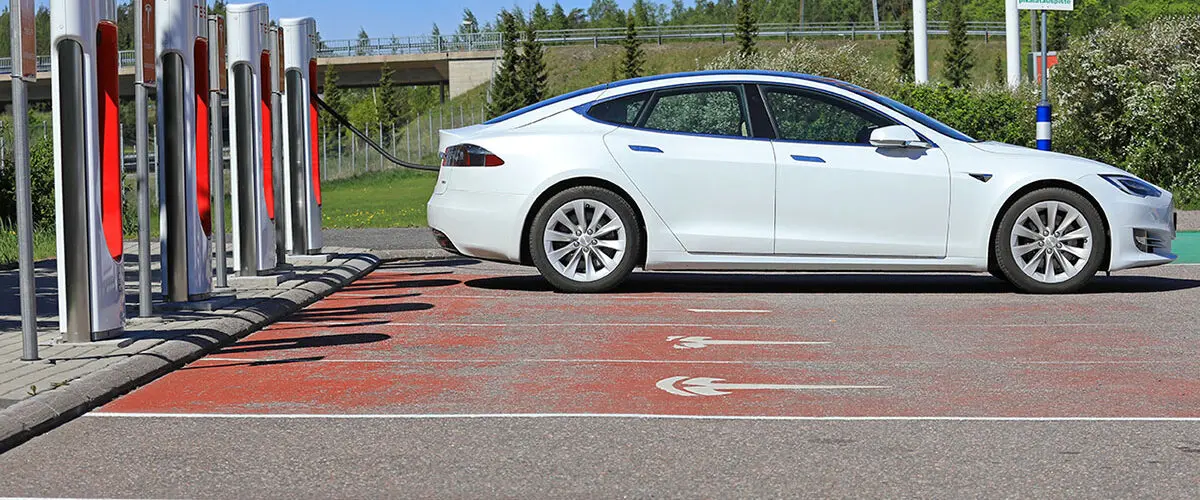Direct-To-Consumer EV Enthusiasts Try Again
Supporters of legalizing direct-to-consumer sales of certain electric vehicles in Connecticut made their case before the legislature’s Transportation Committee Monday, arguing it was time to pass a long-debated exception for companies like Tesla or Rivian.
Connecticut law requires auto manufacturers to sell vehicles through franchise dealerships. For years, electric-only manufacturers like Tesla and, more recently, Rivian and Lucid have sought an exemption. The bill has stalled in the past under lobbying efforts by Connecticut dealerships.
During a public hearing on this year’s bill, supporters often presented the policy as an economic boon and a step towards increasing consumer uptake of electric vehicles and reducing the environmental impact of Connecticut commuters.
“It’s very clear from my research that every car that’s electric instead of gasoline will improve our air quality,” Ken Gillingham, a Yale economics professor, told lawmakers. Gillingham disputed the dire economic impact which state auto dealers have predicted if an exception is made for strictly EV companies.
Amy McLean, Connecticut director of the Acadia Center, said that auto dealers have not suffered job losses in other states which have allowed direct-to-consumer exceptions. Connecticut should amend its “regressive and restrictive” EV sales policies, she said.
“To be quite honest, this bill’s time has come,” McLean said. “How much longer are we going to wait for us to able to move the ball forward, look at the face of what it is in our future, and be brave enough to do the right thing on this bill?”
But while proponents contended the policy’s time had come, others wondered if its time had already passed. Increasingly, traditional automobile companies offer their own electric vehicle models. Chip Gengras, president of Gengras Motor Cars, pointed to electric products manufactured by Ford, Volkswagen, and Volvo.
“If you take just those three brands, they will outsell Tesla in 2022,” Gengras said. “The game has changed significantly and all the OEMs [original equipment manufacturers] are involved.”
Wayne Weikel, director of state affairs at the Alliance for Automotive Innovation, said every auto manufacturer would like to sell electric vehicles to Connecticut consumers. Lucid, Rivian and Tesla were only unique in the sense that they wanted a carve-out in state law in order to do so, he said.
“You would think that there is some law in Connecticut that is prohibiting these companies from selling their products in your state. There is no such law,” Weikel said. “They could already be selling here. All they have to do is follow the same rules on auto distribution that every other automaker is required by law to follow.”
Even one of the bill’s legislative proponents, Rep. Jonathan Steinberg, D-Westport, remarked on the changing nature of the electric vehicle market. Industry trends will impact the necessity for both direct sales and traditional dealers as the increasing number of electric vehicles change the types of support consumers need, Steinberg said.
“I have seen with each passing year, that the facts on the ground have changed, the landscape on the ground is evolving even more rapidly than some would’ve thought even as recently as a couple years ago,” Steinberg said.
Daniel Witt, director of state and local public policy for Lucid Motors, questioned whether the committee felt it could afford to wait for dealers and traditional manufacturers to change their business models. Last year the vast majority of vehicles sold by dealers were internal combustion models and dealerships were profitable, he said.
“We need to ask ourselves whether or not the presence of these EV companies is really the straw that’s going to break the camel’s back,” Witt said. “We would submit to you that the historical record both in the last 10 years and certainly more recent would strongly seem to suggest that everyone will be fine.”
Read the full article at CTNewsJunkie here.




















Follow us